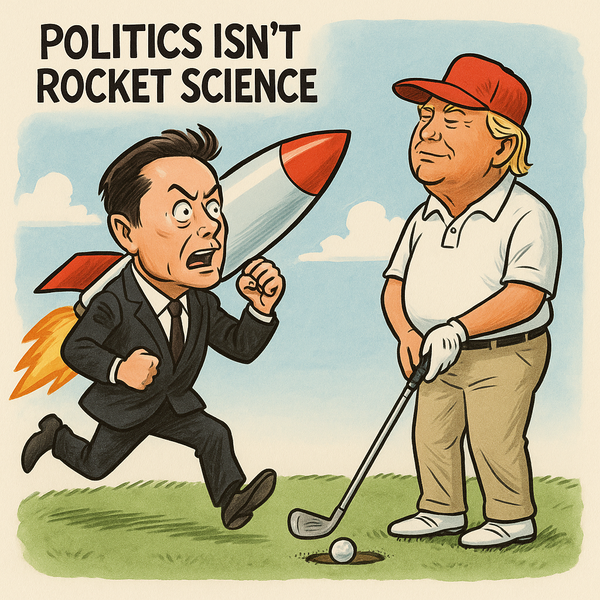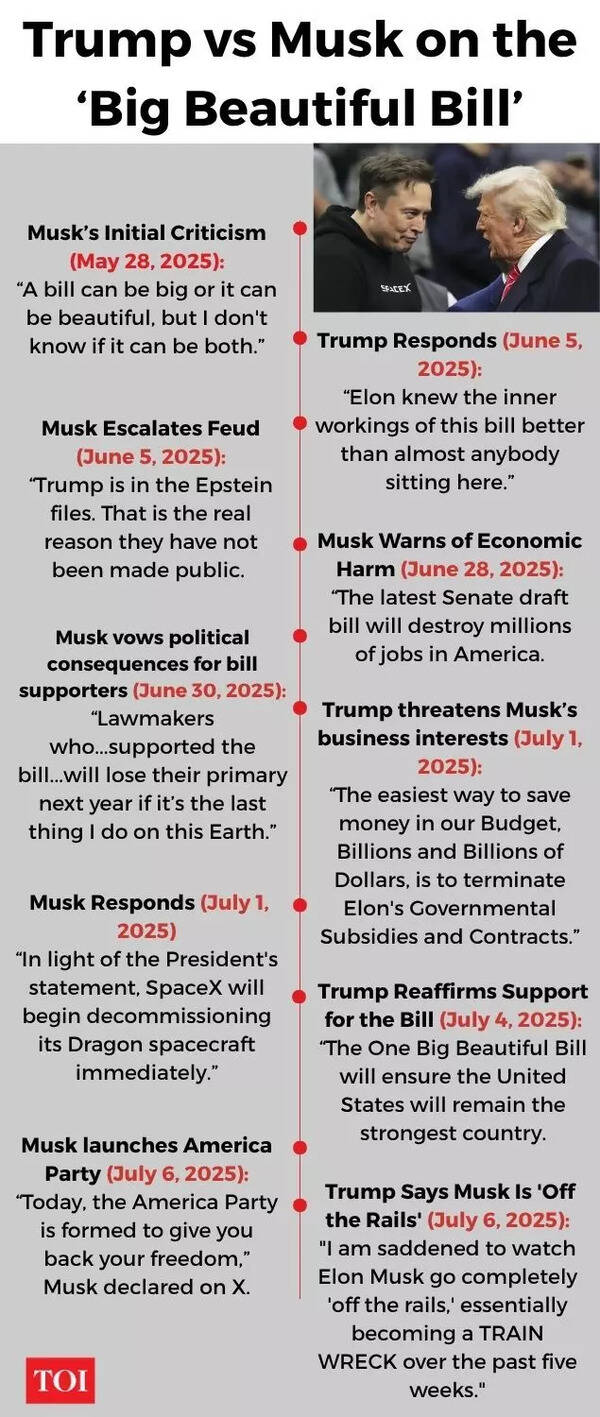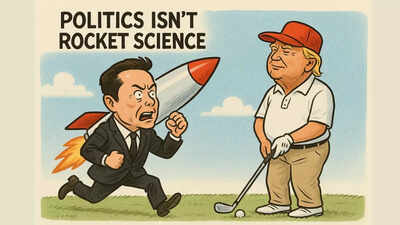[ad_1]
A CNN analysis – an organisation that is equally berated by break-up bros Donald Trump and Elon Musk – summed up the current impasse, or Musk’s inability to dent Trump, with the line: “Politics isn’t rocket science. If it were, President Donald Trump might have something more to worry about in his reignited feud with his estranged ‘first buddy’ Elon Musk.”A few months ago, right after Trump reclaimed the White House, he couldn’t stop gushing about his friend Elon. When SpaceX’s Starship booster landed back on its chopstick arms after a test flight, Trump said at a campaign rally: “Did you see the way that sucker landed today? That’s the greatest thing I’ve ever seen. Elon is an absolute genius – nobody else could ever do that.”In 1952, Israel offered its presidency to Albert Einstein. The man who split the atom and redefined the universe’s laws could have been a ceremonial head of state. Einstein declined, saying he lacked “the natural aptitude and experience to deal properly with people.” Politics, he knew, isn’t rocket science or quantum mechanics. And that’s the rub. The greatest physicist of modern history turned down politics. Elon Musk, who fancies himself the Einstein of our era, is now discovering why.
Musk and Trump: Rockets, Casinos, and the Art of Betrayal
Elon Musk and Donald Trump were never meant to be friends for long. One built his empire launching rockets into orbit and cars down highways; the other built his by branding steaks, casinos, and tower facades with his name. For months, they operated as allies of convenience: Musk bankrolled Trump’s 2024 re-election with nearly $300 million, and Trump rewarded him with sweeping powers as head of the newly minted Department of Government Efficiency (DOGE), a role so absurd it sounded like a Shiba Inu meme come alive.Musk appeared in the Oval Office in February wielding a chainsaw on stage at CPAC to symbolise the slashing of government bloat. For a while, it worked. Trump basked in the billionaire’s adulation, Musk relished the keys to the kingdom, and together they created an unholy tech-populist fusion that made Wall Street swoon.Then came the “big, beautiful bill.” Trump pushed through his MAGA megabill – an infrastructure-cum-tax-cum-spending package that ballooned the deficit. Musk, who once championed balanced budgets and deflationary discipline, called it a “disgusting abomination.” He threatened to primary every Republican who voted for it and set up a new political party – the America Party – to punish the betrayal.Trump, in turn, branded Musk as “off the rails,” warning that third parties never succeed and only create “disruption and chaos.” Their bromance shattered into a predictable feud driven by ego, ideology, and billions in threatened EV subsidies.
Third Parties in America: History’s Graveyard of Outsiders

Trump is not wrong about history. Third parties in America are where political ambitions go to die. Theodore Roosevelt’s Bull Moose insurgency in 1912 split the Republican vote, handing Woodrow Wilson the White House. George Wallace’s segregationist campaign in 1968 won five states but ended with Nixon’s landslide. Ross Perot, the Texas billionaire, won 19% of the popular vote in 1992 on a balanced budget platform but zero electoral votes. Ralph Nader’s Green Party in 2000 siphoned just enough votes in Florida to swing the presidency to George W. Bush.America’s first-past-the-post electoral system punishes split tickets. Ballot access is a bureaucratic labyrinth. Media gatekeeping and debate exclusions freeze out challengers. And the “spoiler effect” haunts voters who might agree with a third party’s ideals but fear wasting their vote. These structural barriers have buried every insurgent from the Socialist Eugene V. Debs to the Libertarian Gary Johnson.Musk’s venture risks the same fate. Politics isn’t rocket science. If it were, Trump might have something to worry about. But as CNN’s analysis put it: “Nothing in the explosive and now-soured flirtation of the world’s richest man with politics suggests he has the magic touch to spark the kind of creative disruption in the Republican Party that he set off in the orbital and electric vehicle industries.”
Why This Isn’t Ceteris Paribus: Musk’s X Factor
Yet Musk is not a normal third-party candidate. He has two weapons no one in history possessed simultaneously:1. Limitless Money – Musk spent nearly $300 million in 2024. That’s more than Perot spent in inflation-adjusted dollars. His war chest can bankroll national petition drives, recruit insurgent candidates, and saturate swing states with advertising until the last undecided voter dreams of dogecoin.2. The World’s Largest Media Platform – Musk owns X (Twitter). Roosevelt needed newspapers, Perot needed paid infomercials, Wallace needed the Deep South’s racial demagogues. Musk has 500 million monthly active users and algorithms he personally controls. He polled his followers about forming the America Party; 1.2 million voted in hours, 65% saying yes. If politics is narrative warfare, Musk owns the battlefield.His reach is unmatched. Trump’s Truth Social has under 10 million monthly users. Musk has over 210 million followers himself. The asymmetry is stark. In 2016, Trump was the insurgent meme-lord on Twitter. In 2025, Musk is the overlord of X, able to amplify, censor, or bury discourse at whim.
But Does He Have a Political Base?

This is Musk’s existential problem. As CNN noted: “Beyond the tech world, where he used his rock star status to funnel young, disaffected male voters toward Trump, it’s not clear that Musk has a broader constituency.”Musk’s online fandom is massive but shallow. Tesla owners love his cars, not necessarily his politics. SpaceX fans marvel at his rockets, not his fiscal conservatism. The MAGA base is cult-like in its loyalty to Trump. Even Vice President JD Vance – once touted as a Musk ally – chose Trump when forced to pick sides.Pollster Lee Carter put it bluntly to CNN: “Donald Trump is the one that has the huge following. Elon Musk certainly helped Donald Trump in the election… but it wasn’t Elon Musk who was center-stage and I don’t think that we’re going to see people follow Elon Musk in the same way that we saw with the MAGA movement.”
Musk’s Political Failures So Far
If politics were rocket science, Musk’s orbital genius would be unstoppable. But his forays suggest otherwise. His most prominent individual foray – the Wisconsin Supreme Court race – was a fiasco. Musk poured millions behind a conservative candidate, only to watch her lose by 10 points. Voters recoiled from his intervention. Tesla’s stock has slumped as Musk’s brand becomes increasingly partisan, alienating Europe’s EV market.His tenure as DOGE chief was theatrically underwhelming. The chainsaw he brandished at CPAC to symbolise cost cuts ended up symbolising something else entirely: the severing of his relationship with Trump.
Trump’s Fortress GOP
The Republican Party remains Trump’s fortress. For a decade, he has purged dissenters and fused his brand into its DNA. He turned a mainstream conservative party into an ethno-nationalist, populist machine with himself as the sun around which all orbit.Musk’s America Party threatens to be the Bull Moose Redux – siphoning votes from Republicans, helping Democrats win, but never seizing power. Trump knows this. That’s why he dismissed Musk’s gambit with scorn rather than fear.But Musk’s goal may not be to dethrone Trump. It may be to outlast him. At 53, Musk is decades younger. If Trump’s empire crumbles – through scandal, age, or electoral defeat – Musk could inherit a disillusioned conservative base seeking a new anti-establishment saviour.

The Einstein Principle
Albert Einstein declined Israel’s presidency because he knew genius in physics doesn’t translate to political dexterity. Musk might yet learn the same lesson. Rockets obey gravity and thrust. Politics obeys no laws but human loyalty, prejudice, memory, and fear.Even if Musk builds the America Party into a disruptive force, he cannot run for president. The Constitution forbids foreign-born citizens from holding the office. He would need a surrogate – a puppet candidate with the charisma to galvanise voters, the obedience to follow Musk’s script, and the moral flexibility to survive in politics’ mud.Finding such a creature is as improbable as landing a rocket booster upright on a floating barge. But then again, Musk did that. As Trump himself once exclaimed at a rally after a Falcon Heavy landing: “Did you see the way that sucker landed today?”Today, Trump’s view has changed. He threatens Musk with executive retribution. “DOGE is the monster that might have to go back and eat Elon,” he warned ominously, suggesting presidential power could be wielded to crush Musk’s companies. In any other era, such a statement might trigger impeachment hearings. In the Trump era, it was Tuesday.
The Final Equation
Politics isn’t rocket science. That is both Trump’s salvation and Musk’s curse. History suggests Musk’s America Party is unlikely to dethrone Trump. But history also shows third parties can wound. Teddy Roosevelt’s Bull Moose handed the presidency to Wilson. Ross Perot arguably handed it to Clinton. Ralph Nader gifted Florida to Bush. If Musk siphons just 3–5% of Republican voters, he could hand Democrats the House in 2026 or the presidency in 2028.Trump calls Musk “off the rails.” Perhaps. But when a rocket goes off the rails, it doesn’t just crash – it explodes, taking everything nearby with it.Einstein refused power because he understood its limits. Musk craves it because he doesn’t. That difference may doom his political ambitions – or make them the most dangerous third-party experiment in American history. After all, politics isn’t rocket science. If it were, Elon Musk would already be president. If he wasn’t South African.
!(function(f, b, e, v, n, t, s) { function loadFBEvents(isFBCampaignActive) { if (!isFBCampaignActive) { return; } (function(f, b, e, v, n, t, s) { if (f.fbq) return; n = f.fbq = function() { n.callMethod ? n.callMethod(...arguments) : n.queue.push(arguments); }; if (!f._fbq) f._fbq = n; n.push = n; n.loaded = !0; n.version = '2.0'; n.queue = []; t = b.createElement(e); t.async = !0; t.defer = !0; t.src = v; s = b.getElementsByTagName(e)[0]; s.parentNode.insertBefore(t, s); })(f, b, e, 'https://connect.facebook.net/en_US/fbevents.js', n, t, s); fbq('init', '593671331875494'); fbq('track', 'PageView'); };
function loadGtagEvents(isGoogleCampaignActive) { if (!isGoogleCampaignActive) { return; } var id = document.getElementById('toi-plus-google-campaign'); if (id) { return; } (function(f, b, e, v, n, t, s) { t = b.createElement(e); t.async = !0; t.defer = !0; t.src = v; t.id = 'toi-plus-google-campaign'; s = b.getElementsByTagName(e)[0]; s.parentNode.insertBefore(t, s); })(f, b, e, 'https://www.googletagmanager.com/gtag/js?id=AW-877820074', n, t, s); };
function loadSurvicateJs(allowedSurvicateSections = []){ const section = window.location.pathname.split('/')[1] const isHomePageAllowed = window.location.pathname === '/' && allowedSurvicateSections.includes('homepage') const ifAllowedOnAllPages = allowedSurvicateSections && allowedSurvicateSections.includes('all');
if(allowedSurvicateSections.includes(section) || isHomePageAllowed || ifAllowedOnAllPages){ (function(w) {
function setAttributes() { var prime_user_status = window.isPrime ? 'paid' : 'free' ; var geoLocation = window?.geoinfo?.CountryCode ? window?.geoinfo?.CountryCode : 'IN' ; w._sva.setVisitorTraits({ toi_user_subscription_status : prime_user_status, toi_user_geolocation : geoLocation }); }
if (w._sva && w._sva.setVisitorTraits) { setAttributes(); } else { w.addEventListener("SurvicateReady", setAttributes); }
var s = document.createElement('script'); s.src="https://survey.survicate.com/workspaces/0be6ae9845d14a7c8ff08a7a00bd9b21/web_surveys.js"; s.async = true; var e = document.getElementsByTagName('script')[0]; e.parentNode.insertBefore(s, e); })(window); }
}
window.TimesApps = window.TimesApps || {};
var TimesApps = window.TimesApps;
TimesApps.toiPlusEvents = function(config) {
var isConfigAvailable = "toiplus_site_settings" in f && "isFBCampaignActive" in f.toiplus_site_settings && "isGoogleCampaignActive" in f.toiplus_site_settings;
var isPrimeUser = window.isPrime;
var isPrimeUserLayout = window.isPrimeUserLayout;
if (isConfigAvailable && !isPrimeUser) {
loadGtagEvents(f.toiplus_site_settings.isGoogleCampaignActive);
loadFBEvents(f.toiplus_site_settings.isFBCampaignActive);
loadSurvicateJs(f.toiplus_site_settings.allowedSurvicateSections);
} else {
var JarvisUrl="https://jarvis.indiatimes.com/v1/feeds/toi_plus/site_settings/643526e21443833f0c454615?db_env=published";
window.getFromClient(JarvisUrl, function(config){
if (config) {
const allowedSectionSuricate = (isPrimeUserLayout) ? config?.allowedSurvicatePrimeSections : config?.allowedSurvicateSections
loadGtagEvents(config?.isGoogleCampaignActive);
loadFBEvents(config?.isFBCampaignActive);
loadSurvicateJs(allowedSectionSuricate);
}
})
}
};
})(
window,
document,
'script',
);
[ad_2]
Source link







